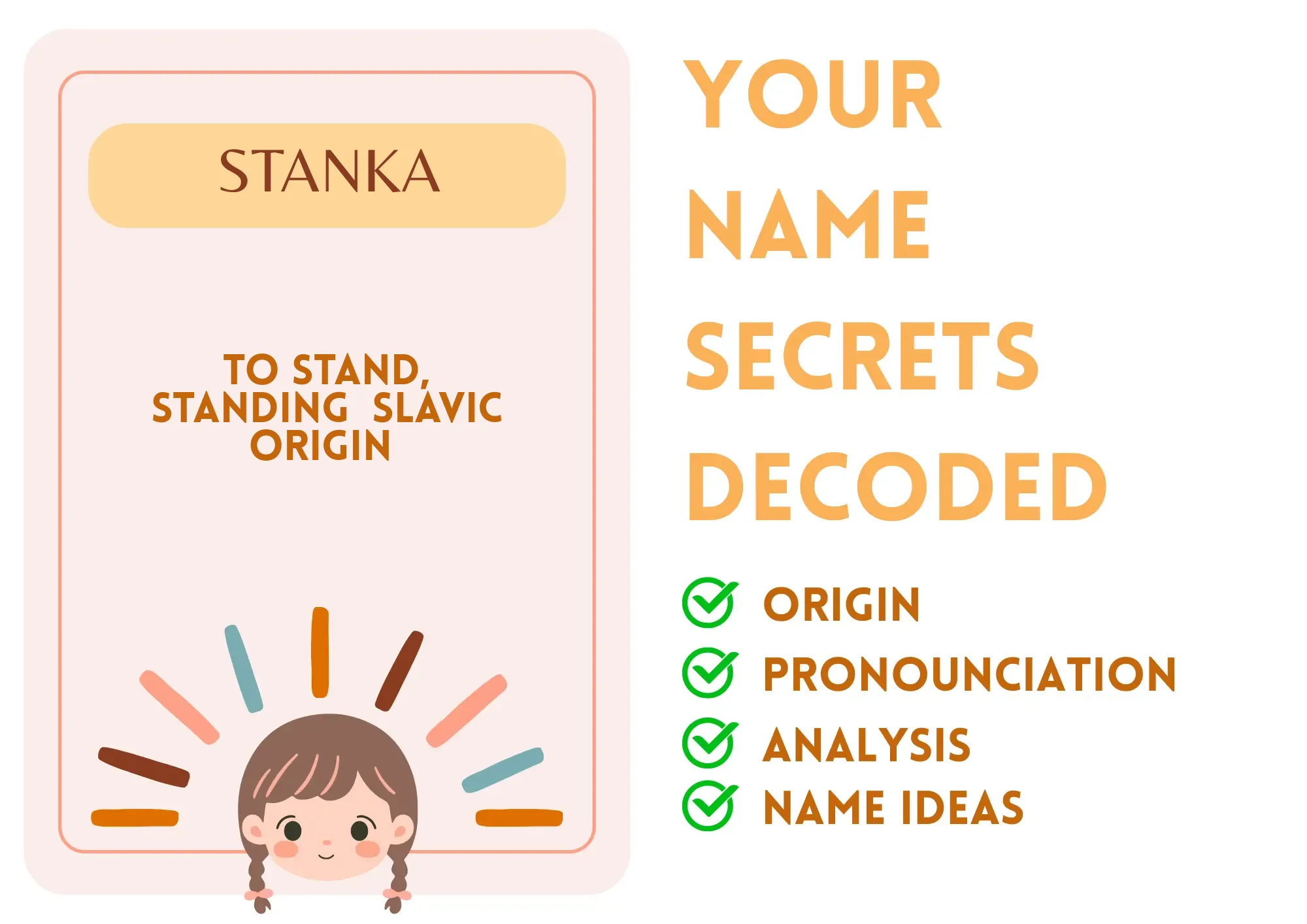
Stanka
Stanka is a name of Slavic origin primarily used in Bulgarian and Serbian cultures. It is traditionally a feminine name derived from the word 'stanka', translating to 'to stand' or 'standing'. The name embodies strength and resilience, making it a cherished choice among parents. Stanka often carries connotations of steadfastness and stability.
This name is not widely used outside of Eastern Europe, lending it an air of uniqueness. While it may not be common in popular culture, Stanka evokes positive feelings associated with strength and determination. It is easy to pronounce and write, with its clear phonetic components.
The name is well-received in its cultural contexts, viewed as a symbol of endurance and reliability.
Basic Information
Gender: Girl
Sounds Like: STAN-kah
Pronunciation Explanation: The emphasis is on the first syllable 'STAN', followed by a softer 'kah'.
Summary and Meaning
Meaning: to stand, standing (Slavic origin)
Origin: Stanka has Slavic roots, particularly in Bulgarian and Serbian cultures, reflecting the linguistic heritage of the region.
Usage: Stanka is a traditionally feminine name, associated with female identity.
Name Number (Chaldean)
Name Number (Pythagorean)
Popularity (Global Rank)
Overall: 25437
Girls: 47202
Most Popular in
Religious and Cultural Significance
Religion: Christian
Background: While not strictly tied to any specific religion, Stanka is prevalent in predominantly Christian countries within Eastern Europe, where Christianity has influenced naming traditions.
Cultural Significance: In countries like Bulgaria and Serbia, Stanka represents traditional values of strength and stability, often associated with positive familial and communal traits.
Historical Significance: In Bulgarian history, Stanka has appeared in folklore and tales, often representing strong female characters who embody resilience and courage.
Popular Culture
Literature and Mythology: The name Stanka appears in various Slavic folk tales and stories, often linked to characters demonstrating virtue and strength.
Movies and Television: There are few mainstream references to Stanka in international cinema, but it may be found in regional films and shows, portraying its cultural significance.
Feelings and Perceptions
Perception: Stanka is perceived positively within its cultural context, associated with strength and reliability.
Positive Feelings: Unique, strong, resilient, meaningful, culturally rich.
Negative Feelings: May be challenging for non-Slavic speakers to pronounce or recognize.
Practical Considerations
Ease of Writing and Calling: Stanka is simple to write and pronounce, consisting of six letters and two syllables, making it easy to remember and use in conversation.
Common Typos and Misspellings: Stankaah,Stanka,Stankaah,Stanka
Common Nicknames: Stani,Kika,Stas
Stanka Popularity
Stanka Usage and Popularity By Country
| Country | Rank (Overall) |
|---|---|
| Slovenia | 295 |
| Slovakia | 327 |
| Montenegro | 406 |
| Bulgaria | 418 |
| Croatia | 597 |
| Serbia | 653 |
| Chile | 4468 |
| Lebanon | 8817 |
| Germany | 10529 |
| Hungary | 11519 |
Stanka Usage and Popularity By City
| City | Rank (Overall) |
|---|---|
| London | 15610 |
| New York | 24523 |
| Paris | 14866 |
| Melbourne | 14378 |
| Toronto | 17131 |
| Montréal | 10903 |
| Plovdiv | 177 |
| Vancouver | 12900 |
| Zurich | 7884 |
| Niagara Falls | 903 |
Compatibility Analysis
Famous Persons Named Stanka
-
-
-
-
-
-
-
-
-
-
Stanka Setnikar Cankar
Born: January 10, 1953 - Ljubljana
university teacher | economist | politician
Related Names
Similar Sounding Names:
Tanka,Manka,Kavka